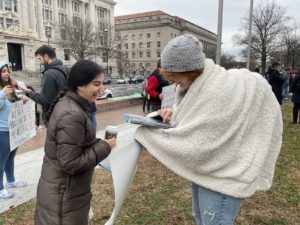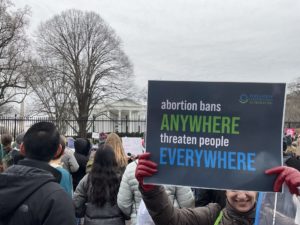Field & Outreach, March 2023
Written by Grace Long, Acting Field Coordinator | Published: March 13, 2023
Roe Fell and the Nation Reacted
Achieving the goals of the progressive population movement hinges on reproductive rights. Our twin goals of gender equality and environmental sustainability require that the right to bodily autonomy is respected and that everyone can choose when, whether, and with whom they have children.
In 2022, we witnessed a loss of that right in the United States.
My first day at Population Connection, in February 2022, was two months after the Supreme Court heard oral arguments in Dobbs v. Jackson Women’s Health Organization. The state of Mississippi defended its 15-week abortion ban—the subject of the case—by arguing that Roe v. Wade was wrongly decided. Jackson Women’s Health Organization, the state’s only abortion clinic, argued that Mississippi was in violation of the U.S. Constitution by infringing on the right to abortion before fetal viability. During these arguments, five justices signaled a willingness to overturn Roe, including the three nominated by Trump.

We knew the official decision was coming soon, and that it likely wouldn’t be good. What surprised us was when, a few weeks before the decision was set to be released, a draft was leaked to the press. We rushed to mobilize our volunteers as protests erupted across the country, with reproductive and women’s rights organizations leading the pack. My social media feeds were flooded with information on how to obtain FDA-approved abortion medications in case bans went into effect. Millions of dollars were raised for abortion funds. My coworkers and I stood in front of the Supreme Court building, texting supporters about how to find their local rallies while we listened to speeches by activist leaders. And then, on June 24, 2022, the Supreme Court overturned Roe v. Wade. The other shoe had dropped.
For the second time in as many months, I was sending thousands of texts to our contact lists, urging everyone to join the crowds of people protesting the decision and demanding that their states protect the right to choose. The reproductive rights landscape transformed almost overnight. The Supreme Court’s decision to let states legislate abortion quickly resulted in a confusing mess of laws and lawsuits, as reproductive rights organizations leveraged their state constitutions to challenge trigger bans. These included pre-Roe abortion bans that were never taken off the books and laws written and passed in the decades since the 1973 Roe v. Wade decision by legislatures hopeful that it would one day be overturned. Many states quickly moved to protect abortion access by enshrining the right into law, expanding coverage under Medicaid, and prohibiting state employees from participating in investigations against anyone seeking an abortion.
Days after the decision came down, we hosted a virtual event with legal expert and Population Connection Action Fund Board Chair Dara Purvis, where she walked us through the impacts of the decision. She explained just how much power the justices gave to state legislatures, and how pro-choice legislators could defeat bans and pass protections. Dara and speakers at the nationwide rallies emphasized that abortion rights were on the ballot in the upcoming election.
The messaging worked. Abortion rights had an amazing midterm election, thanks in large part to incredibly high voter turnout. Constitutional amendments enshrining the right to abortion were passed by enormous margins in California, Michigan, and Vermont. Kansas and Kentucky voters rejected proposed amendments that would have given lawmakers carte blanche to pass severe abortion restrictions or outright bans. In Montana, voters defeated a ballot measure that would have allowed for criminal charges against medical providers who failed to take extreme measures to treat infants born with terminal medical issues. Voters made it clear that when abortion was on the line, they would come out in droves to defend it.

On January 22, 2023, the 50th anniversary of Roe, a coworker and I braved the cold and rain to attend the Bigger Than Roe rally in DC, the sister event to a Wisconsin march hyping voters for an upcoming state Supreme Court election there. The conversations that day were about liberating abortion—how to free it from shame and stigma, how to ensure everyone has access, and how to get patients and providers the respect they deserve.
Last year, we came together as a nation to defeat threats to reproductive freedom at the polls and in state houses across the country. Join us this year to stay active in keeping these threats at bay and in working toward passing legislation that goes above and beyond the provisions of Roe. With the majority of voters on our side, we can do even better!
